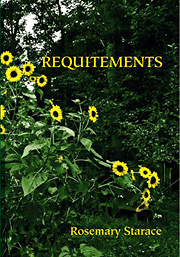 I’ve read the poems in this slender volume at least four times in the past eight months and they have yet to lose their affective power for me — which is strange, since I would not seem to be the target audience for a collection about adoption or being an adoptee. Then again, I’ve been listening to blues music for 25 years and I wasn’t exactly the target audience for most of that, either. Who hasn’t felt, at one time or another,
I’ve read the poems in this slender volume at least four times in the past eight months and they have yet to lose their affective power for me — which is strange, since I would not seem to be the target audience for a collection about adoption or being an adoptee. Then again, I’ve been listening to blues music for 25 years and I wasn’t exactly the target audience for most of that, either. Who hasn’t felt, at one time or another,
double like wings
this rainy day folded
patient and oily
shedding a sky
(“I Am Double”)
or marveled at robins at daybreak?
Robins
A trickle of sweetness
out of the quiet emerges,
announcing what night
had again prepared.How darkness works.
You come to know this
each time you are taken by it
and released.
See what I mean? These are poems with mountains in them, blackeyed susans, crows, boats and grackles. The moon joins other mythical figures in a list of famous adoptees, and you think, me too! The broken heart is not merely universal, but a key to the universe:
Creation falls to me. Its vast taxonomies,
the drifts of my ancestors. Home
is the Nebula, grandfather crab.
(“Confession”)
This is a poetry very much like the blues, full of lacrimae rerum, and reading it, hearing it, I feel the tension unknotting in my gut and a weight lifting in my chest that I didn’t know was there. How does that work? There are certain metaphors, I think, that are very close to the root images of language: when things fall from the sky, for example, something beyond mere sadness or gratitude is triggered, and natural objects such as wings and flowers are so intimately bound up with our perceptions of the world, it may be more accurate to say, for example, that the face is a flower symbol than vice versa. And:
Dark careening flecks
possess the pull of fine words,
those understudies
for the thing missing—
“snow-calm” and “trees,” too,
tug the heart out from its cave.
(“Arrival”)
Dig deep into language and emotion, as Starace does, and thought itself — “something like wind” (“Fifty Grackles”) — may become a luminous presence. Einstein in a dream says: “All space is compassion” (“Sunflower Ramble”). An absence which is more than an absence: entire religions have been built around less.
There is
no other music like this song
you can walk through, these cries
that every day erect a new cathedral
over daily streets.
(“Blue Hour”)
It’s been a long holiday, and I’m tired; I regret I can’t give this marvellous chapbook the review it deserves. (Do read the three sample poems on the page from Elephant House Press.)


Thanks for bringing this to our attention, Dave. These are moving poems. I’m glad to know of Elephant Tree House Press too.
Yes, their upcoming chaps look delectable. I should say that Requitements is beautifully designed, complete with a printer’s colophon.
What glorious poems you’ve excerpted here. I want to read this book now.
Au contraire, I can’t imagine a chapbook deserving a better review :-)
Who IS this Rosemary Starace. Reading her words…I feel like we’ve been best friends for years and I couldn’t be more grateful for it!
I’ve known Rosemary Starace for years and I couldn’t be more grateful for it! Dave’s review of Requitements is so thoughtful~ as is Rosemary and her writing.